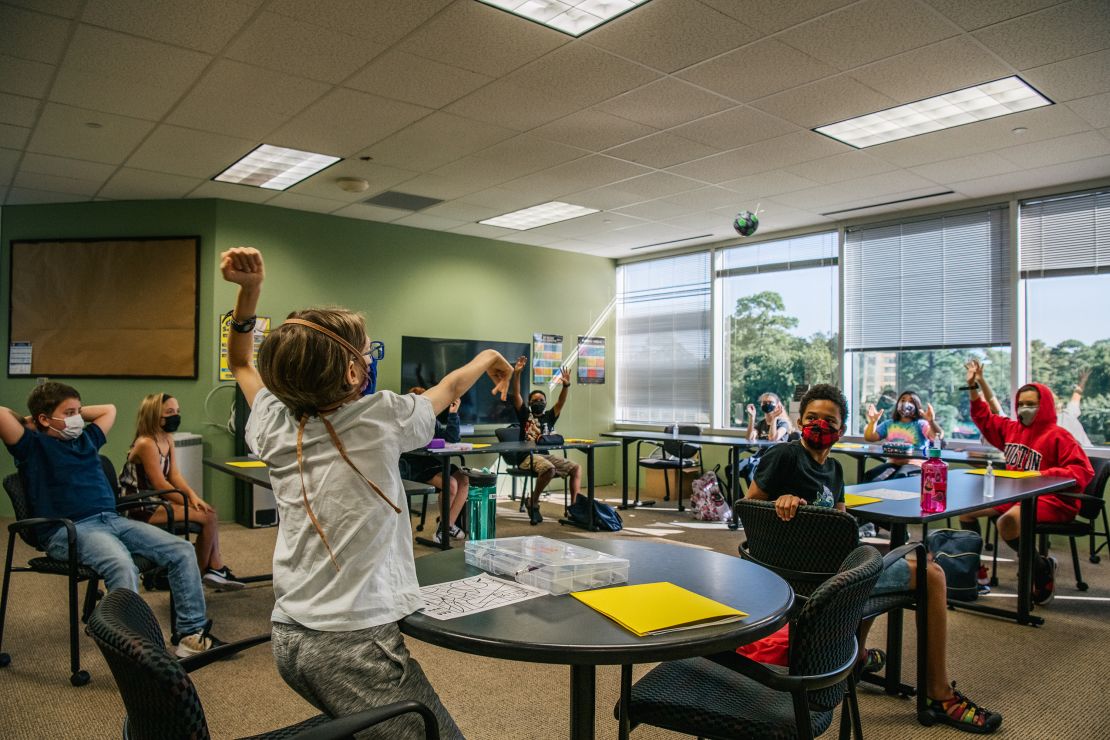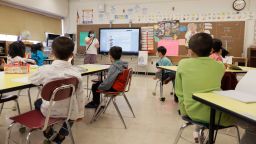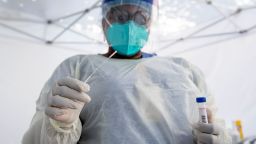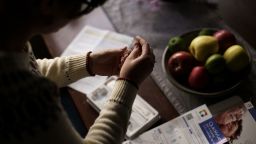Schools are shutting down and children’s hospitals are filling up with young patients sick from the latest, most highly transmissible coronavirus variant, Omicron. Parents and caregivers are once again faced with what to do to keep their kids safe and occupied during another year of pandemic life.
Is it OK to send children to school and resume extracurriculars? If my kid is doing virtual learning, can we gather friends together? What if my child has a medical condition? Can I take my vaccinated child and their unvaccinated younger sibling to see friends?
To answer your questions, I spoke with CNN Medical Analyst Dr. Leana Wen, who is an emergency physician and professor of health policy and management at the George Washington University Milken Institute School of Public Health. She is also author of “Lifelines: A Doctor’s Journey in the Fight for Public Health” and the mom of two children, ages 4 and 21 months.
CNN: If my children’s school is open for in-person instruction, is it safe to send them?
Dr. Leana Wen: It’s important to note that virtually every activity that involves interacting with others has some level of risk when it comes to Covid-19 transmission, especially with the virus surging.
With that in mind, I would advise families to ask themselves this question: Is in-person school essential? Many would say yes. A lot of children have really suffered as a result of not having in-person instruction and are not doing well with remote learning. In addition, parents and caregivers may need school for childcare purposes so that adults can work. If in-person school is essential, there are ways to make it less risky. Then the question becomes, how can we do so in the safest way?

CNN: What if the school isn’t doing much to protect kids — for example, it doesn’t require masks and there is no testing?
Wen: Just like with every setting, there are different layers that all add protection. An ideal, lowest-risk situation employs all of them: All staff and students are vaccinated, mask-wearing is required, twice-weekly testing is available, and there is great ventilation.
That’s not the reality for most schools. That doesn’t mean no kids can go to school until every criterion is met. Rather, you should do what’s in your control to reduce risk.
Even if others around you may not be vaccinated, your child being vaccinated protects him or her very well from severe illness due to Covid-19. A high-quality mask (N95 or KN95 are best) will protect your child, even if others aren’t reliably or consistently wearing masks. Other measures like testing would be nice to have, but if they aren’t available, the risk to your child can still be low with masking and vaccination.
CNN: Is it OK to send my kids to school and do extracurriculars? Are there some extracurriculars that are safer than others?
Wen: Here, I would ask another question: How important is it to your family that your child avoid Covid-19? Specifically, what are the medical circumstances of your household? If everyone in your household is optimally protected with vaccination and booster (if eligible for the booster), and people are healthy, you could decide that the risk of becoming severely ill from Covid-19 is very low. This is particularly relevant now, as Omicron is more than 95% of all infections in the United States, and growing evidence shows that this variant causes less severe illness for vaccinated individuals.
Many families may decide that the price to actively avoid Omicron, given how contagious and prevalent it is, is too high. It would be reasonable for them to decide that their kids should participate in all the extracurricular activities they wish to.
Other families may choose to be more cautious. Perhaps there is someone in the family who is immunocompromised. Perhaps there is an unvaccinated younger sibling, or they just don’t want to get Covid-19 — there are some people who will pay a heavier price to avoid it.
In the latter case, families could choose extracurriculars that are lower risk. Activities that could be done outdoors are much lower risk than indoors. Indoors, look for things where distancing is possible and where masks must stay on. Use common sense: Tennis is probably going to be safer than wrestling, and yearbook in a well-distanced classroom is probably going to be safer than choir practice in a small, cramped space.
If your local ERs are very full, you might consider deferring activities that have a higher risk of injury. Or at least ask your kids to use additional caution, as you may otherwise have a very long wait to tend to the broken arm or get stitches!
CNN: If my kid is doing virtual learning, can we gather friends to learn together?
Wen: A lot of families did this last year and formed pandemic pods. It’s an option this time around, too. It helps to define the rules of engagement. Is everyone vaccinated? Will everyone exercise a similar level of caution in other aspects of their lives (for example, not going to indoor restaurants)? Know that if you are in a pod, you are assuming one another’s risks, and with how contagious Omicron is, if one person gets Covid-19, others will likely, too.
CNN: What if there is a younger sibling who’s under age 5 and not yet vaccinated? Can I take the whole family to the zoo outdoors or to the indoor movies, or just the vaccinated child?
Wen: There are a lot of families that will look at the data around Covid-19 and decide that their young, unvaccinated child is at low risk for severe illness, and it’s not worth taking many additional precautions to prevent them from getting infected. There will be others who want to be as cautious as is reasonable.
My family is trying to take common-sense precautions with our two under-5 children. We are members at our local zoo and enjoy taking them on weekends. We stay away from crowds and only go to outdoor exhibits. I would not take our kids to the movies, where they could be surrounded by people who have their masks off to eat or drink.
That’s our decision, though, and I could see us making a different decision if we had an older child who was vaccinated and good about masking. In that case, perhaps that child could still go to the movies, and to playdates, if they kept on a mask, even if there is a younger, unvaccinated sibling.
CNN: Speaking of individual circumstances, what about someone who has a child with diabetes, asthma or another underlying medical condition?
Wen: Getting that child vaccinated will be key, as someone with underlying medical conditions is more likely to have severe outcomes from Covid-19 compared with someone who is otherwise healthy. Some families might decide it’s still important for that child to have as much of a pre-pandemic, normal life as possible. Others might want to take additional precautions. I’d also speak to my pediatrician to assess the individual risk to my child.
CNN: I’m still on the fence about vaccinating my children. Should I get them vaccinated?
Wen: Yes. More than 6.5 million children 5 to 11 years old have received the Covid-19 vaccine, and more than 15.6 million kids 12 to 17 years old have as well. Studies have been so clear that the vaccines are highly protective against severe illness from Covid-19 and are very safe. Getting your children vaccinated allows them to return to many aspects of pre-pandemic life and gives your entire family more peace of mind.
CNN: If my kid gets sick from the Omicron variant, what should I do?
Wen: Anyone who tests positive for Covid-19 should immediately isolate. You should notify their day care or school. You should also test everyone else in your household right away. If all family members have Covid-19, they don’t need to isolate from each other. But if there are some people in the house who are negative and some who are positive, those who have the coronavirus should stay separated from those who don’t.
Follow guidance from your doctor, your local health department or school protocols, or the US Centers for Disease Control and Prevention for how long your child’s isolation should be. During the isolation period, it’s important not to have your child get together with their friends. They should generally stay at home. If they go outdoors to get fresh air, they should wear a mask and stay distanced from other people.
CNN: What if everyone in the family is vaccinated and has already had Omicron? Do you have super immunity — and if so, shouldn’t we try to get infected?
Wen: It’s probably true that someone who had been vaccinated and has now recovered from Omicron has additional protection. Reinfection with Omicron hasn’t really been documented yet, and some studies suggest that infection with Omicron may protect against Delta.
That said, I wouldn’t advise that people try to catch Covid-19 on purpose. That’s because hospitals are so overwhelmed. There is still a chance — though a very low chance — that a vaccinated person could become severely ill. You don’t want to end up needing a hospital right now.
For vaccinated people, it’s reasonable to take basic precautions like masking in public, indoor places to reduce the likelihood of infection, while also resuming the aspects of life that you find the most important — which includes kids returning to school.








